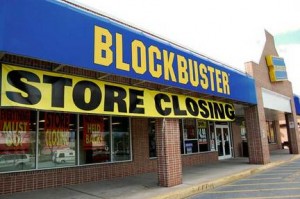a new song for blockbuster
A year and a half ago, I wrote “Don’t Stop Retailin’, Blockbuster,” an encouraging post to the then-struggling video rental chain. Blockbuster had just hired a new advertising agency and CEO Jim Keyes was mapping out his digital media-heavy plan for re-invigorating the business. I offered a different perspective saying, “While Blockbuster’s Keyes may want to evolve the business from a video-rental chain to a full-service media delivery company, I would recommend he put more focus on reinvigorating Blockbuster as a retail brand” — and I offered three suggestions for doing so.
Last week’s news of the chain’s bankruptcy filing prompted me to re-visit my post and re-consider the direction I had recommended. Since Keyes didn’t follow my advice (gosh darn it!), I can’t be blamed for the chain’s current predicament.
But even so, I now realize that my emphasis on the brand’s brick-and-mortar foundation should have been balanced with recommendations for how to shore up new brand creds in the digital space. Perhaps instead of adapting the name of the classic pop hit “Don’t Stop Believin‘” by 80’s band Journey for the blogpost title, I should have chosen another of the group’s hits, “Anyway You Want It.”
Certainly re-building Blockbuster’s retail business was — and still is — a critical contributor to the company’s survival. But the fact is — and was — consumers want options. Blockbuster needs to develop robust digital media capabilities and offer an integrated multi-channel customer experience which gives consumers the choice and flexibility they expect and demand.
No doubt Keyes and his team have been working on this, though. And they still find themselves squeezed by Netflix in the online and mail space and Coinstar’s Redbox in the retail arena.
So, perhaps there’s a bigger issue at play here. Perhaps Blockbuster’s challenges aren’t limited to channel and content distribution. Perhaps it isn’t about whether they provide movies in bits or boxes or both. Perhaps it’s about belief — the core Blockbuster brand belief, that is.
What does Blockbuster believe in? I can’t really say — and that’s a problem.
It’s a problem because without the clarity of purpose that comes from a strong core belief, the company is rudderless. But don’t take my word for it. Listen to what Howard Schultz said about his company’s recent turnaround.
He’s quoted in a recent HBR interview saying, “What I stand for is not just to make money; it’s to preserve the integrity of what we have built for 39 years — to look in the mirror and feel like I’ve done something that has meaning and relevancy and is something people are going to respect. You have to be willing to fight for what you believe in.” (emphasis mine)
Only a short 2 years ago Starbucks was really struggling, and if it hadn’t been for the company’s storehouse of cash, the chain might have been filing for its own bankruptcy. But Schultz led the company out of its funk largely based on what he believed — and what he knew the Starbucks brand believed.
I don’t mean to suggest that all Keyes has to do is articulate what Blockbuster believes in and and all will be made right. But I do think that a strong brand core belief could serve as the foundation the business desperately needs.
And I know that if Blockbuster believed that movies ignite the imagination and satisfy the soul, for example, it would have a strong point of differentiation from its competitors who are competing on access and price.
Furthermore, having a clear, compelling passion for being could:
- direct executive decision-making about which elements of the business to start/stop/continue to feed the company’s innovation pipeline as well as people’s passion for movies
- unite all stakeholders, including franchisees, store managers, and employees in delivering an outstanding customer experience that’s all about a passion for movies
- bond the company to customers who share the brand’s passion for movies
Perhaps I wasn’t wrong when I looked to a Journey song to describe the remedy for Blockbuster’s woes — but perhaps I should have left it at “Don’t Stop Believin.'”
related posts:
